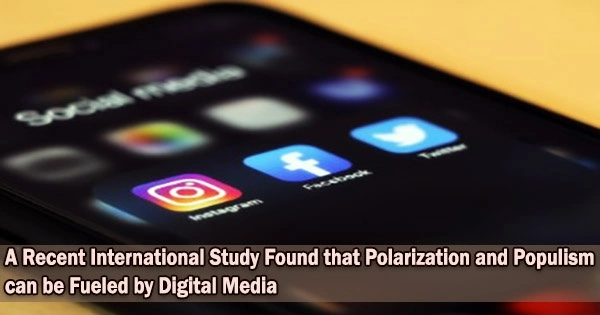Tech corporations argue that the results are equivocal in the argument over whether the increased use of digital media is causing the deterioration of democracy.
However, a team of experts from around the world conducted the largest study of its kind to examine this assertion and discovered that while social media is not always negative, it can definitely fuel polarizing viewpoints, populism, and political mistrust, especially in advanced democracies.
The researchers, from the Max Planck Institute for Human Development and the Hertie School in Germany, and the University of Bristol in the UK, systematically assessed studies investigating whether and how digital media impacts people’s political behavior.
According to studies, there are both positive and negative consequences of digital media, including the promotion of polarization and populism. Positive benefits include how they can boost political knowledge and expose people to a wider variety of news sources.
Furthermore, the political environment has a significant impact on how effects like increased political engagement and declining trust in institutions manifest. It has been shown that these trends are advantageous for developing democracies but can be unstable for democracies that are already established.
“The advantage of our systematic review against the background of a divisive and often partisan debate is that it allows objective conclusions to be drawn,” said author and research scientist Philipp Lorenz-Spreen of the Max Planck Institute for Human Development.
What is most concerning is our finding that in mature democracies such as the US and Europe, social media use causes increased polarization and decreased trust in institutions. Although further research is needed, this reveals some clear trends and indicates that governments and civil societies need to take steps to better understand and actively shape the interplay of digital media and democracy.
Professor Stephan Lewandowsky
At the institute’s Center for Adaptive Rationality, he studies how new technologies can help to promote participatory democracy online.
“While the impact of digital media on democracy cannot be judged as simply ‘good’ or ‘bad,’ the results clearly show that digital media can have several negative effects on political behavior,” he added.
In their review, published today in Nature Human Behaviour, the researchers combine causal and correlational evidence from nearly 500 articles on the relationship between digital media and democracy worldwide. The analysis was structed around the 10 most researched political outcome variables: political participation, knowledge, trust, news exposure, political expression, hate, polarization, populism, network structure, and misinformation.
“When studying complex political and social phenomena, it is important to determine whether there is in fact a causal relationship,” said author and doctoral researcher Lisa Oswald from the Hertie School in Berlin.
The researchers therefore focused on the subset of articles reporting causal evidence of a relationship between digital media and democracy. These include large-scale field experiments conducted on social media platforms and articles in which causal conclusions could be drawn due to factors such as data having been collected at different points in time.
The research findings can also help to clarify important issues in the young research field, for example whether the much-discussed phenomenon of echo chambers in which people tend to encounter only like-minded people online really exists. The results depend heavily on the digital media in question. There was no evidence of echo chambers in studies looking at news exposure, for example, but they do seem to emerge within social media networks.
“Our analysis covered studies conducted all over the world, allowing us to shine a light on how the effects of digital media differ across political systems,” said co-author Ralph Hertwig, Director at the Max Planck Institute for Human Development.
The positive effects of digital media on political participation and information consumption were most pronounced in emerging democracies in South America, Africa, and Asia. Negative effects in terms of increasing populism and polarization and decreasing political trust were more evident in established democracies in Europe and the United States, for example.
Co-author Professor Stephan Lewandowsky, Chair in Cognitive Psychology at the University of Bristol, said, “What is most concerning is our finding that in mature democracies such as the US and Europe, social media use causes increased polarization and decreased trust in institutions.”
“Although further research is needed, this reveals some clear trends and indicates that governments and civil societies need to take steps to better understand and actively shape the interplay of digital media and democracy.”
















